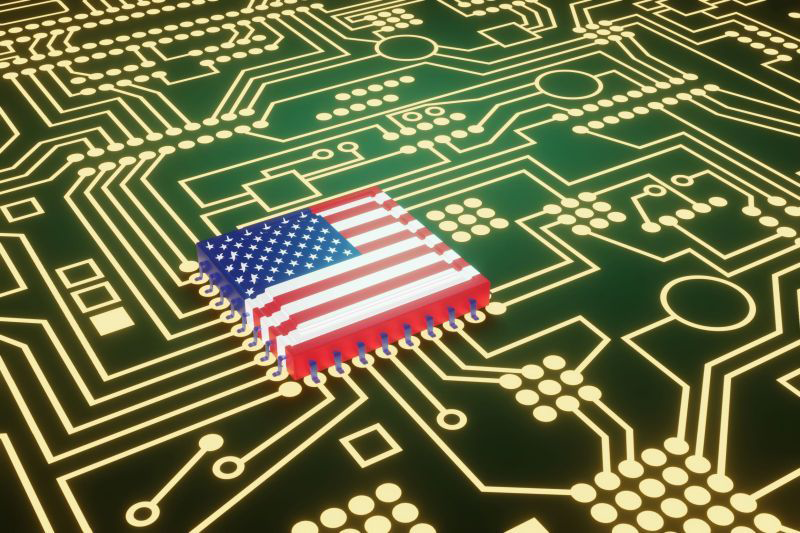
|
Dear IPC Members:
In another demonstration of the European Commission’s intent to make Europe a more autonomous global leader in microelectronics, the EC this week approved an “Important Project of Common European Interest (IPCEI)” designed to spur up to €22 billion in public and private investment in microelectronics and communication technologies. |
| Also, this week, IPC co-convened the annual Critical Environmental Requirements for Electronics forum, which covered eco-design policies in the United States and European Union; PFAS regulations; and much more. IPC offers a wealth of resources to help you deal with the dizzying international array of environmental, health, and sustainability challenges.
Please read on to learn more, including how you can join in our industry’s advocacy efforts on these and other business-critical issues in Washington, Brussels, and worldwide.
All the best, |
Chris Mitchell
Vice President, Global Government Relations
The Headlines at a Glance:
TOP NEWS OF THE WEEK
- EC Approves Multibillion-Euro Microelectronics Investment Project
QUOTE OF THE WEEK
- IPC’s Alison James on the EU’s €22B Microelectronics Initiative
ENVIRONMENT AND HEALTH
- IPC Co-Hosts Critical Environmental Requirements Forum
- EU Parliament Votes to Require Due Diligence on Labor and Environmental Risks
- IPC Urges EU to Ease Reporting Burdens on Manufacturers
- IPC Urgently Seeking Member Input on PFAS Chemicals
SUSTAINABILITY
- June Issue of SMT007 Magazine Covers Sustainability
UPCOMING EVENTS
- Quarterly Economic Update and Market Outlook, June 27
- On-Shoring Advanced Packaging and Assembly, July 10-12
HELP US SPREAD THE WORD ON SOCIAL MEDIA
KEEP IN TOUCH WITH US
TOP NEWS OF THE WEEK
EC Approves Multibillion-Euro Microelectronics Investment Project: The European Commission this week approved an “Important Project of Common European Interest (IPCEI)” designed to support research, innovation, and “first industrial deployment” of microelectronics and communication technologies across the value chain. In a LinkedIn post, European Commissioner for Internal Market Thierry Breton said the IPCEI “is yet another demonstration of the EU Chips Act already triggering considerable public and private investment across the European semiconductor value chain: from materials to design, from equipment to advanced packaging.” IPCEIs are multinational EU projects designed to address important market challenges with public funding and coordination. This IPCEI, submitted by 14 EU Member States, will provide up to €8 billion in public funding, which is expected to unlock an additional €13.7 billion in private investments. IPC Contact: Alison James.
QUOTE OF THE WEEK
 |
“IPC welcomes the approval of the IPCEI with its potential to further develop innovation in the EU including, importantly, in the fields of packaging and advanced packaging.”
– IPC Senior Director of European Government Relations Alison James, on the European Commission’s approval of a multibillion-euro microelectronics initiative. |
ENVIRONMENT & HEALTH
IPC Co-Hosts Critical Environmental Requirements Forum: The annual Critical Environmental Requirements for Electronics forum, co-convened by IPC and the Information Technology Industry Council (ITI), took place on June 6. Over 70 participants from over 13 countries learned about the latest developments in chemical, product, and sustainability policies that affect the electronics industry. Speakers included representatives of Intel, PlasticsEurope, The Umbrella Project, and the U.S. Department of State. We thank our attendees and sponsors for a productive and insightful event. To learn more, visit the event landing page linked above; or the IPC Environment and Health advocacy page; or our Sustainability for Electronics page.
IPC Contact: Suhani Chitalia.
EU Parliament Votes to Require Due Diligence on Labor and Environmental Risks: Reuters reports, “The European Parliament [on June 1] approved a groundbreaking draft law that would make it mandatory for large companies to check whether their suppliers are using child labor or damaging the environment.” The Corporate Sustainability Due Diligence Directive (CS3D) “would also require big companies to publish plans on how they will transition to a net-zero economy by cutting carbon emissions.” The next step is negotiations with the EU Council, representing member states, to reach a final deal. IPC recently joined with 35 other industry groups in calling for “a reasonable approach that is manageable for companies in practice,” and we will continue our advocacy on this issue. IPC Contact: Alison James.
IPC Urges EU to Ease Reporting Burdens on Manufacturers: IPC recently participated in a European Commission Industrial Forum on EC President Ursula Von Der Leyen’s commitment to simplify reporting burdens and reduce them by 25%. An EC proposal is expected by this autumn. This exercise is the first of its kind at the EC level and comes in recognition of the high administrative burdens placed on EU companies. IPC highlighted several areas including duplicative reporting under environmental legislation; disparities in Member State reporting burdens; and the many existing and pending sustainability reporting measures. The EC’s intent is not to diminish policy impact but rather to gain a fuller understanding of the complete burden on companies with a view to reduction and simplification. IPC Contact: Alison James.
IPC Urgently Seeking Member Input on PFAS Chemicals: In anticipation of a potential EU ban on per- and polyfluoroalkyl substances (PFAS), IPC is urgently calling on all electronics manufacturers to gather and share with us information on the use of PFAS in your supply chains. A lack of industry data could result in limited or no advocacy by IPC, which in turn could result in few or no exemptions to the PFAS restriction. Without exemptions, the industry could be forced to decide between withdrawing from the EU market or adopting PFAS alternatives in their products and processes. As the Financial Times reported, “Even with the EU’s proposed transition period, chipmakers and their suppliers will need to develop a whole new class of chemicals and overhaul production processes across multiple sectors.” Time is running out; please let us know ASAP if you can provide such data this summer. IPC Contact: Suhani Chitalia.
SUSTAINABILITY
June Issue of SMT007 Magazine Covers Sustainability: Sustainability is happening. Your organization either sees it as a cost of doing business, or an opportunity to improve overall business operations. So, how do we embrace this shift? How do we keep up—or ahead—so we don’t get swept to the side? I-Connect007’s June issue of SMT007 magazine covers the topic of sustainability best practices for electronics manufacturing and featured within is an interview with Kelly Scanlon, IPC’s lead sustainability strategist, on why sustainability matters. Along with Kelly’s interview, long-time IPC members and contributors provide insight on environmental, social, and corporate sustainability activities. Give it a read. IPC Contact: Kelly Scanlon.
UPCOMING EVENTS
Quarterly Economic Update and Market Outlook: Virtual, June 27. In this free IPC webinar, get up to date on the latest economic developments and gain valuable insights from IPC Chief Economist Shawn DuBravac as he helps you navigate an uncertain economic landscape.
On-Shoring Advanced Packaging and Assembly: Falls Church, VA, July 10-12. Bringing together government agencies, the Defense Industrial Base (DIB), and advanced packaging and assembly providers, this IPC/IMAPS workshop will focus on efforts to onshore advanced packaging and ways to address U.S. Government requirements related to microelectronics assembly. IPC Contact: Chris Mitchell.
PLEASE "LIKE" AND "SHARE" OUR LINKEDIN POSTS
 |
|
 |
“Companies are setting sustainability targets, and they are talking about these targets, measuring themselves against their ability to achieve these targets, and looking at their customers and suppliers to ensure they are doing the same.” Kelly Scanlon, IPC’s lead sustainability strategist, answers critical questions about how sustainability affects the electronics manufacturing industry in an in-depth feature interview, “Why Does Sustainability Matter?” with Nolan Johnson, I-Connect007. |
IPC joined 26 U.S. electronics manufacturing companies to call on Congress to support $100M in PCB sector funding, emphasizing that rebuilding the PCB sector is critical to U.S. national security. The funding would also advance the goals of the CHIPS Act to ensure the autonomy and resiliency of the U.S. supply chain for semiconductors and advanced electronics. News release: https://hubs.li/Q01SsHgg0 |
KEEP IN TOUCH WITH US
Meet the IPC GR Team: Whether it is engaging with policymakers in the Americas, the European Union, or Asia, the IPC Government Relations (GR) Team proactively seeks opportunities to educate, inform and influence policymakers on policies that spur innovation, growth and competition, while protecting human health and the environment. But our success depends on your support and engagement. Learn more and get involved in IPC advocacy today! IPC Contact: Chris Mitchell.
Follow, like and share us on Twitter and LinkedIn.
Contact one of us if you have any questions or insights to contribute.
See prior editions of Global Advocacy Report.
Explore our IPC Government Relations information online.
|